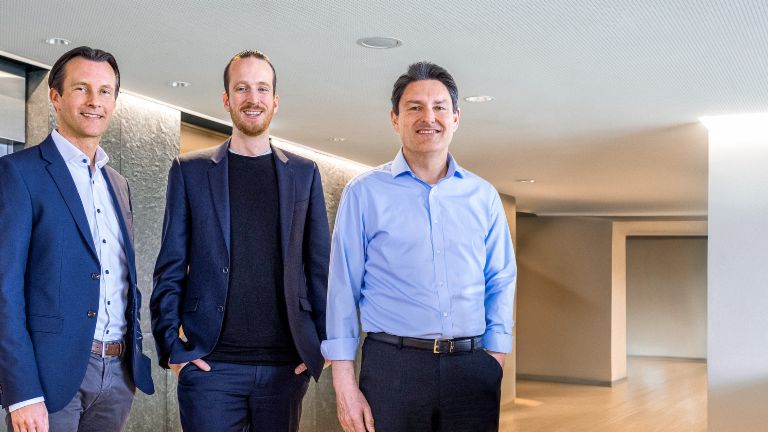When is it beneficial to outsource debt collection?
When it comes to engaging a debt collection service, companies tend to ask the same questions: Is it even worthwhile for my company to outsource debt collection? And if it is, when and in which form? We consulted an expert and summarized the answers for you.
- If a company has outstanding receivables, engaging a debt collection service provider is an effective solution, regardless of the size of the company or sector it operates in.
- KPIs like the default rate provide information about the payment practices of customers and the best time to take action.
- Efficient receivables management calls for extensive expertise in the form of well trained staff and modern technology.
- Outsourcing this job to a professional is a good move if companies do not want to invest in this themselves and instead would prefer to focus on their core area of expertise.
- There are several options. You can either engage a debt collection service provider to act as a trustee or sell the receivables to ensure a quick cash injection.
There are a lot of myths and misconceptions about debt collection. Generally, a little bit of research is sufficient to dispel these. What do you need to consider if you have outstanding debts and want to engage a debt collection service provider? We’ve answered the four most common questions for you below.
Which companies would benefit from engaging a debt collection service provider?
In principle, engaging a debt collection service provider is beneficial for any company that has outstanding receivables. This applies both to large corporations and all other companies. Outstanding payments from defaulting customers don’t just block a company’s cash flow but often tie up staff capacities that are needed elsewhere. “Conventional receivables management is simply not one of the core areas of expertise of most companies. In smaller companies in particular, outstanding receivables are often processed in a very rudimentary way,” says Andreas Behmenburg, Regional Sales Manager at EOS Germany. Companies have to weigh up whether it is worth establishing their own expertise in this area or more profitable to outsource the debt collection process to an external service provider that already has the relevant experience. And it absolutely makes sense to hand over even smaller receivables to a debt collection service provider. Many companies continue to have a write-off threshold that is far too high.

Conventional receivables management is simply not one of the core areas of expertise of most companies. In smaller companies in particular, outstanding receivables are often processed in a very rudimentary way.
The sector a company operates in tends to play a subordinate role in the decision about whether to engage a debt collection service provider. What is more important is the information available as a basis for recovering the receivables, i.e. what information you have obtained beforehand about your defaulting customers. “In this context, an insurance company is often in a better position than a small online retailer who sells on account,” says Andreas Behmenburg. “But broadly speaking, any commercially dunned receivables are suitable for recovery by a debt collection service provider.”
When is the right time to hand over my outstanding receivables to a debt collection company?

Receivables may be handed over to a lawyer or debt collection company as soon as they are in arrears, i.e. outstanding. From a strictly legal perspective, there is no need for a reminder, although many companies will grant their customers one last chance to settle their debts before passing on the case to a service provider like EOS. “Previously it was usual to send defaulting customers three reminders before passing on the receivable to a service provider. This dunning cycle has become much shorter at many companies, because every day that goes by reduces the probability of getting their money back.”
The Days Sales Outstanding (DSO) and default rate serve as indicators to warn of an increasing level of payment defaults. Every company has to decide for itself which values should trigger a response. Depending on sector, there are industry-specific data that can be used as guidance. “In banks, for example, a default rate of up to two percent is regarded as healthy. Once it goes above this then the processes need to be looked at. To stay with the example of banks, the reason for the defaults may be to do with the calibration of the risk systems for checking creditworthiness. But often the cause may simply be internal receivables management processes that can be optimized.”
Why is a professional debt collection partner worthwhile for my company?
For many companies, an efficient receivables management system is a major investment. Not only do you require well trained personnel that will need continuous professional development in statutory regulations and industry-specific particularities, you also need the right technology to support the process e.g. through data analysis.
“Nowadays, anyone using good technology with a high degree of automation that nevertheless allows a personalized approach to defaulting payers will achieve a good result,” says Andreas Behmenburg. In this context, the human factor should naturally not be overlooked. In a dynamic environment like debt collection the expertise of your personnel continues to be the basis for a successful outcome. This applies to national collections but even more so to cross-border recovery. “Debt collection works differently here in Germany than it does in Spain, for example. And in Spain it is done differently from the way it is handled in the Czech Republic or Russia,” says Behmenburg. This is why it is worthwhile engaging an internationally operating debt collection expert like EOS that is well versed in the national particularities and laws of the respective target country and recovers the debts locally.
Especially in times of economic downturn, companies need to take a professional approach to receivables management. The 2008 financial crisis showed that those creditors who acted quickly had a better chance of getting their money back, says Andreas Behmenburg: “If a defaulting customer is faced with a pile of reminders they are more likely to pay the creditor that is the most visible. That’s just the way it is.” Debt collection service providers know when and how to approach defaulting payers and their caseworkers are trained to find a fast and fair solution for all parties, even in times of crisis. The effects of Covid-19 are likely to have an even greater negative impact on the economy than the last financial crisis, so companies need to act quickly now and put the necessary arrangements in place.

What forms of debt collection are there?
Basically there are two ways of transferring receivables to a debt collection company:
- In fiduciary collection, creditors continue to own their receivables. Debt collection service providers like EOS approach the defaulting payers in a fiduciary capacity to recover outstanding receivables on behalf of their clients. The client continues to bear the risk of default.
- In receivables purchasing, on the other hand, ownership of the receivables changes hands on payment of an agreed price for them. This means that the seller transfers the default risk to the purchaser.
“The major advantage of selling receivables is instant liquidity. It’s a tool used not just by banks but also by companies in the telecommunications and transport/mobility sectors, sometimes for accounting reasons,” says Behmenburg. There is also less work involved in selling receivables. With the fiduciary collection model, on the other hand, the creditor retains full control and oversight of the receivables owed to them. “There is no single right or wrong option when choosing a collection model,” says Behmenburg. “Our sales staff specialize in finding the best individual solution for each company.”
Why choose EOS to be your debt collection partner?
The EOS Group has been looking after its customers’ receivables for more than 40 years now. Initially the collection arm of Otto Group, EOS now operates worldwide. Thanks to our own call centers and a nationwide field service we process outstanding receivables with a high level of expertise.
Does your company operate internationally? So do we. With 26 national offices and a network of partners in more than 180 countries we make sure that borders are not an issue. So if you have outstanding receivables overseas we are happy to handle them.
We’re able to do this thanks to our more than 7,500 collection specialists who do their utmost, day after day, to find the best solution for the client AND the defaulting payers. They are supported by our own specially developed collection technology based on big data that maximizes the chances of recovery.
If you have any other questions please make an appointment with our sales personnel.
Please contact us if you have any other questions.
EOS Deutscher Inkasso-Dienst GmbH
Steindamm 71
20099 Hamburg
Phone: +49 40 2850 0
Fax: +49 40 2850 1400
Photo credits: Westend61 / Getty Images, Jakob Helbig / Getty Images, Yagi Studio / Getty Images, EOS
Explore more from EOS



